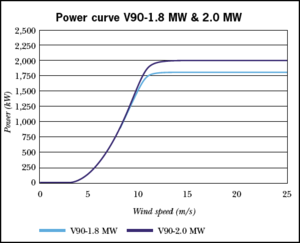Efficiency: Difference between revisions
Jump to navigation
Jump to search
No edit summary |
No edit summary |
||
| Line 3: | Line 3: | ||
With wind energy, ''efficiency'' is often confused with ''[[capacity factor]]''. | With wind energy, ''efficiency'' is often confused with ''[[capacity factor]]''. | ||
Wind turbines | Wind turbines can be quite efficient, capturing and converting as much energy from the wind as physically possible, although at a rather narrow range of wind speed. | ||
At wind speeds slower than ideal, there is not enough wind energy to generate power at the full rate of the wind turbine’s design. | At wind speeds slower than ideal, there is not enough wind energy to generate power at the full rate of the wind turbine’s design. | ||
At faster wind speeds, the blades must be pitched to be less efficient, so that their rotation rate remains constant. | At faster wind speeds, the blades must be pitched to be less efficient, so that their rotation rate remains constant. | ||
Revision as of 16:08, 10 August 2017
With wind energy, efficiency is often confused with capacity factor.
Wind turbines can be quite efficient, capturing and converting as much energy from the wind as physically possible, although at a rather narrow range of wind speed.
At wind speeds slower than ideal, there is not enough wind energy to generate power at the full rate of the wind turbine’s design.
At faster wind speeds, the blades must be pitched to be less efficient, so that their rotation rate remains constant.
